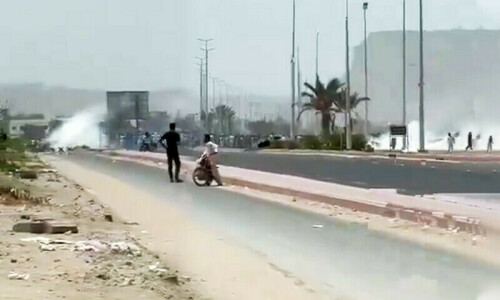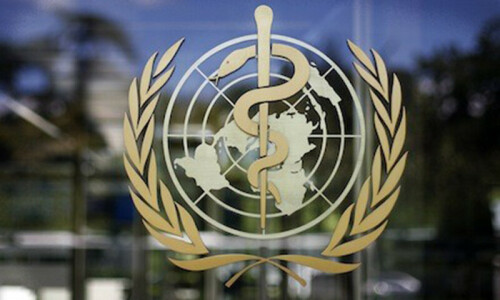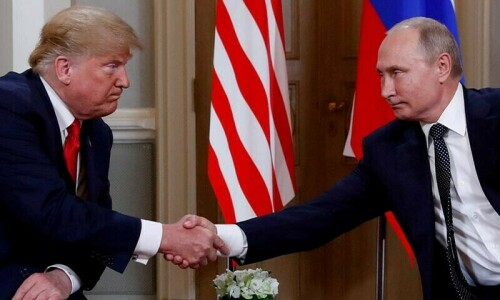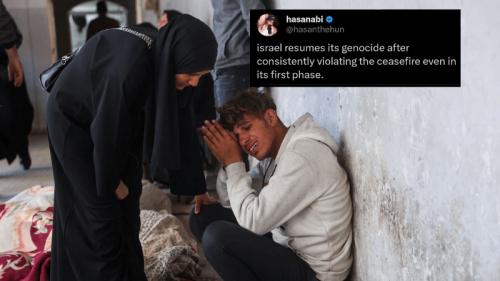OF late, it seems as if the state of Pakistan is caught up in a constant battle with its citizens, from Balochistan to Karachi to the more central areas of Pakistan. And the longer these skirmishes go on and the wider they spread, it is the women who seem to be at the receiving end.
In the past couple of days, we watched our phone screens horror-struck as Mahrang Baloch called for a protest in Gwadar. No one was surprised that the call was met with resistance; those headed to Gwadar were stopped by road blockages, intimidation, and eventually the use of violence. And once again, as the mainstream media was busy elsewhere, social media filled the vacuum.
When the television cameras are missing, the story is told to those who hold phones in their hands. But this time, the stories the phones capture is one in which women are at the forefront. In the past two days, these have been dynamic young, educated women leading a movement. Mahrang Baloch and Sammi Deen have become household names since they came to Islamabad a few months ago.
In those wintry days, we had watched women bearing the brunt of the state’s bullying tactics as they were taken into custody and efforts were made to forcibly bus them out of the capital. Those images and what we saw on Sunday symbolise a disregard for the general public, especially for women who are now pushing societal boundaries to express themselves politically.
Women who dare to speak out are not welcomed here and some of them will be punished.
This is true of many parts of Pakistan, even though there is no doubt that the Baloch have been meted out particularly vicious treatment. One simply has to hear the stories of how Mahrang, Sammi and others have been compelled to take to the streets to understand this. But despite this, there is a larger pattern of oppression vis-à-vis women who became politically active.
In the more privileged parts of the country, where once political persecution was limited to the top tier — Benazir Bhutto, Maryam Nawaz — it has now spread to not just other women leaders but also ordinary workers and protesters. Indeed, the incarceration of PTI women has taken the persecution of women to new lows. Yasmin Rashid continues to be in jail regardless of age and health, as does Alia Hamza. Sanam Javed and Khadija Shah have become household names, simply because they decided to take part in a protest. And before someone begins to say ‘May 9’, there is no harm in remembering that so far no evidence has been brought forward proving the involvement of any of these women in criminal behaviour.
Now a young woman has been picked up for being part of the PTI’s social media team. After all, why stop at young men when women too can handle phone screens and typing as well as their male counterparts?
Earlier, when the PTM first emerged on the scene, during the PTI tenure, women activists such as Sanaa Ejaz and Gulalai Ismail were targeted.
Most of these cases involve educated women, who have their own professional identities and have opted for activism or politics in their own right. When they are targeted, it must send a chilling message to other women who may harbour dreams of stepping outside their homes or working, as well as to their reluctant parents. It is not as if this message is lost on those who are doing this.
After all, this is a state and society which has never been comfortable with women who want to take their fate into their own hands. Or speak their mind. And something has to be done, if more and more of them want to engage politically. Consider the harassment of women online. It’s a constant barrage and it is not a matter of the social media wing of one party. The rest are catching up just as quickly. This is because misogyny is so widespread.
If in the past week a well-known host, who was once known for his views on culture, held forth on the reason why all women get a job on news channels, there was another man, a ‘journalist’ who in his vlog accused a politician’s wife of doing magic. The reaction from those in power is always expedient. Relevant cases are pursued while inconvenient ones are ignored, even though the welfare of women was said to be the reason for Peca and the new defamation law in Punjab.
Women are afforded no greater protection now after the passage of these laws than they were earlier — but then, their safety has never been a priority. After all, the fate of those who speak, be they Mahrang or Sammi, Alia Hamza or Imaan Mazari, is similar. Some are more privileged than others, thanks to their ethnicity or class or city; some will be more widely celebrated or admired. But the message is not very different. Women who dare to speak out are not welcomed here and some of them will be punished in this way or that and made an example of.
PS: Arshad Sharif’s case was finally heard by the highest court of the land on a grey morning in Islamabad. As the lawyers gathered in front of the bench, their voices were drowned out by the monsoon clouds, which appeared to have broken on Constitution Avenue itself.
It has nearly been two years since his death and one year since the last hearing. And yet, seconds into the hearing the court was busy with the number of judges who should be on the bench and the government claimed it was still sorting out the legalities to get information from Kenya. As if there is no information that it needs to gather in Pakistan itself about why he left. No one expects the state and its various parts to ever reach any conclusion about his death; but I wonder if they realise the conclusion that people have already reached and what it says about their relationship with the country.
The writer is a journalist.
Published in Dawn, July 30th, 2024
















































